De Nederlandse dichter, vertaler en journalist Jan Eijkelboom werd op 1 maart 1926 in Ridderkerk geboren. Zie ook alle tags voor Jan Eijkelboom op dit blog.
De kunst
In die tijd trokken amateurs
met zwarte kastjes er op uit
om in een poortdoorgang
het tegenlicht te vangen
dat door de lindeblaadjes scheen.
Of ze betraden gretig het park
op de dag van de eerste sneeuw.
Vanaf meegenomen keukentrapjes
legden zij vast hoe ijzel of rijp
van takjes toverstokjes maakte.
Ook ik verbalisant betrapte
dat voortvluchtig licht en
sloot het op in een sonnet
waaruit het ijlings is ontsnapt.
Hij had geen talent
Hij had geen talent voor tragiek,
verdonkeremaande rampspoed
bij het leven, meanderde
door een landschap tot aan
een toevallige stad
waar hij plotseling zag:
hier kom ik vandaan.
Af en toe viel hem in
dat hij misschien wel bestond.
Ook zag hij een vrouw
van wie het bestaan
met geen pen
te ontkennen.
Ze paarden en hadden geluk.
Toen hij later tot zijn verbazing
het leven moest laten
liet hij één boodschap na:
als jullie mij gaan verstrooien
ga dan met je rug naar de wind toe staan.
Vox humana
In een klein dijkhuis staat,
ziet hij door ’t uitvergrote raam,
het oude orgel bijna naakt.
Over de toetsen ligt een loper.
Tussen de twee koop’ren kandelaars
staat een gezangboek open.
Hij hoort weer het asmatisch steunen:
loflied of klaagzang – eender zeurt
deze muziek, tot hij die deur
snel weer vergrendelt. En toch,
o mocht hij nog een keer,
geknield voor ’t orgelfront,
de trappers voor de vrouw bewegen
die boven hem haar psalmen zong.
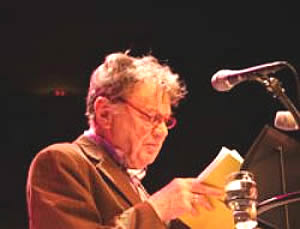
Jan Eijkelboom (1 maart 1926 – 28 februari 2008)
De Engelse schrijver Jim Crace werd geboren op 1 maart 1946 in St. Albans, Hertfordshire. Zie ook alle tags voor Jim Crace op dit blog.
Uit: The Devil’s Larder
“Grandma said I wouldn’t catch him eating the dough. ‘That’s only greedy birds,’ she explained. ‘The angel comes to kiss it, that’s all, otherwise my bread won’t rise.’ And, sure enough, I often saw the birds come down to peck at our strip of dough. And, sure enough, my grandma’s bread would nearly always rise. When it didn’t she would say the birds had eaten the strip of dough before the angel had had a chance to prove it with his kisses.
But I never saw an angel on the windowsill. Not even once.
The thought of angels in the yard terrified my girls and so, when we made bread — in that same house, but thirty years along the line and Grandma long since gone to kiss the angels herself — I used to say, ‘To make good bread I need an angel in the kitchen. Who’ll be the angel today and kiss the dough?’ My girls would race to kiss the dough. I’ll not forget the smudge of flour on their lips. Or how, when I had taken the scarred and toppling loaves of bread out of the oven, they’d demand a strip of hot crust to dip into the honey pot or wipe around the corners of the pâté jar. This was their angel pay. This was their reward for kissing.
Now there are no angels in the kitchen. I’m the grandma and the girls are living far too far away to visit me more than once or twice a year. I’m too stiff and out of sorts to visit them myself unless I’m taken in a car, but I don’t like to ask. I stay in touch with everyone by phone. I keep as busy as I can. I clean, although the house is far too large for me. I walk, when it is warm and dry, down to the port and to the shops and take a taxi back. I keep plants in the yard in pots and on the windowsills. I eat mostly out of a can or frozen meals or packet soups.
This afternoon, I thought I’d fill my time by making bread. My old wrists ache with tugging at the dough of what, I think, will have to be my final loaves. I tore a strip off for good luck, kissed it, put it on the window-sill. I warmed the oven, greased the tins, and put the dough to cook on the highest shelf. Now I’m waiting at the window, with a smudge of flour on my lips and with the smell of baking bread rising through the house, for the yard to fill and darken with the shadows and the wings.”
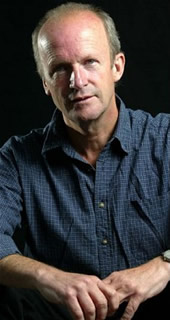
Jim Crace (St. Albans, 1 maart 1946)
De Zwitserse dichter, schrijver, cabaretier en liedjesmaker Franz Hohler werd geboren op 1 maart 1943 in Biel. Zie ook alle tags voor Franz Hohler op dit blog
Uit: Der Langläufer
“Er versuchte noch etwas zu beschleunigen. Er hatte geglaubt, als er gegen Abend aus der Waldroute abbog, er sei der großen Masse der Läufer entronnen, aber jetzt, da er ins Tal kam, hörte er wieder das bekannte Knirschen hinter sich, zusammen mit dem leicht klingelnden Geräusch der einsetzenden Stockspitzen. Es ärgerte ihn,daß um diese Zeit, wo die meisten den Sammel- und Ausgangsplätzen zuliefen, noch jemand die Idee hatte, ins Tal hinauf zu gehen, es war schon schattig und die Loipe stieg an, man brauchte Ausdauer, wenn man in dem Tempo weitergehen wollte, das er jetzt angeschlagen hatte. Er wollte in dem Tempo weitergehen, er wollte sich nicht überholen lassen, er wollte die Loipe so frei vor sich sehen wie jetzt, er hatte begonnen, Langlauf zu machen, weil er menschenleere Flächen durcheilen wollte, und war erschrocken gewesen über die Menschenmassen, die sich auf den zwei Spuren ausbreiteten, wo das Überholen fast in gleich wenigen Momenten möglich war wie auf der Autostraße.
Vor allem hatte ihn die eigentlich erfreuliche Tatsache, daß diese Sportart auch für alte Leute möglich war, mit einem eigenartigen Widerwillen erfüllt, wenn er sah, wie viele halb mumifizierte Kolonnen sich hier mühsam von einem Hügelchen zum nächsten schoben, oder wenn er, die talwärts führende Spur hinunterfahrend, die ältlichen Schweißschwaden der Hinaufkeuchenden durchpflügte.
Deshalb wohl war er jetzt abgebogen, und deshalb wollte er sich auf keinen Fall überholen lassen, auch wenn das Knirschen hinter ihm näherkam. Er konnte mit den Beinen nicht mehr wesentlich schneller laufen, eigentlich war es ihm immer rätselhaft, wie jemand schneller sein konnte als er.
Er gab noch mehr Druck auf die Stöcke, was ihn zwar am linken Ellbogen ziemlich schmerzte und auch an der Hand, er war gestern hingefallen, aber er wollte niemanden vor sich sehen, es war schön hier, der Bach links war fast zugefroren, und auf den Bäumen des Waldes lag frischgefallener Schnee.“
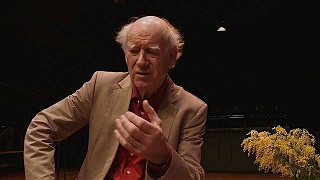
Franz Hohler (Biel, 1 maart 1943)
De Britse schrijver Giles Lytton Strachey werd geboren op 1 maart 1880 in Londen. Zie ook alle tags voor Lytton Strachey op dit blog.
Uit: The Letters of Lytton Strachey
“To Leonard Woolf
Hotel d’Angleterre St Jean de Luz Basse Pyrénées France December 21st 1900
Dear Woolf,
I got your kind letter with much joy. The sunny south is at present not quite so sunny as it ought to be, but it has been charming – blue sea, and hills and fresh air and heat enough for anyone. The country is Basque and rather strange, with bullock-carts and things at every turn – flooded with English of course, which makes it more or less unpleasant. The only man of any amusement (barring a decayed millionaire and a gouty Baron) is an Oxford person, who teaches little boys, and in the intervals writes poems for the Spectator. You can imagine the sort of Oxford Schoolmaster poetical absurd sort of person. I go and listen to him and laugh for evenings at a time. He gives me his poems to read (bad enough) and good advice (rather worse) and his views on Shakespeare (quite ridiculous). We talked the other day of people we should like to meet. I mentioned Cleopatra. He said: `I should rather see Our Lord than anyone else.’ I had to reply ‘Oh, I put him on one side as inhuman.’ And so we were embarked on the Grand Controversy. He was silly enough but not so silly (I should think) as the Junior Dean, and allowed me to laugh as much as I liked, even going so far as to admit that the divinity has its ludicrous side. I said that purely as a matter of taste four in one pleased me rather more than three in one, and seven in one most of all – but he wouldn’t follow up this line of argument. […]
your loving GLS”
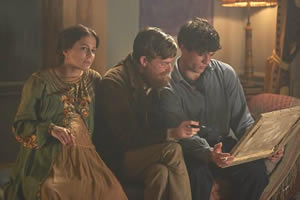
Lytton Strachey (1 maart 1880 – 21 januari 1932)
Ed Birch als Lytton tussen Phoebe Fox (Vanessa Bell) en James Norton (Duncan Grant)
in de BBC miniserie “Life in Squares” uit 2015
De Amerikaanse dichter Robert Traill Spence Lowell werd geboren op 1 maart 1917 in Boston. Zie ook alle tags voor Robert Lowell op dit blog.
July In Washington
The stiff spokes of this wheel
touch the sore spots of the earth.
On the Potomac, swan-white
power launches keep breasting the sulphurous wave.
Otters slide and dive and slick back their hair,
raccoons clean their meat in the creek.
On the circles, green statues ride like South American
liberators above the breeding vegetation—
prongs and spearheads of some equatorial
backland that will inherit the globe.
The elect, the elected . . . they come here bright as dimes,
and die dishevelled and soft.
We cannot name their names, or number their dates-
circle on circle, like rings on a tree—
but we wish the river had another shore,
some further range of delectable mountains,
distant hills powdered blue as a girl’s eyelid.
It seems the least little shove would land us there,
that only the slightest repugnance of our bodies
we no longer control could drag us back.
To Speak of Woe That Is in Marriage
“It is the future generation that presses into being by means of
these exuberant feelings and supersensible soap bubbles of ours.”
—Schopenhauer
“The hot night makes us keep our bedroom windows open.
Our magnolia blossoms. Life begins to happen.
My hopped up husband drops his home disputes,
and hits the streets to cruise for prostitutes,
free-lancing out along the razor’s edge.
This screwball might kill his wife, then take the pledge.
Oh the monotonous meanness of his lust. . .
It’s the injustice . . . he is so unjust—
whiskey-blind, swaggering home at five.
My only thought is how to keep alive.
What makes him tick? Each night now I tie
ten dollars and his car key to my thigh. . . .
Gored by the climacteric of his want,
he stalls above me like an elephant.”
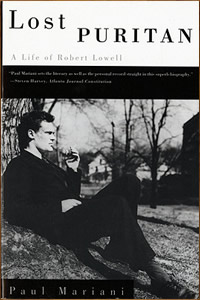
Robert Lowell (1 maart 1917 – 12 September 1977)
Cover biografie
De Nederlandse schrijfster Myrthe van der Meer (pseudoniem) werd geboren op 1 maart 1983 in Den Bosch. Zie ook alle tags voor Myrthe van der Meer op dit blog.
Uit: PAAZ
“Als Felix de hoorn op de haak legt, kijkt hij me argwanend aan.
‘Wat kwam Simon doen?’
‘Gewoon.’ antwoord ik nonchalant, ‘Even vragen of ik een mailtje kan sturen. Ik ben al bijna klaar.’
‘Jij mocht toch niets nuttigs meer doen? Het enige wat jij nog zou doen is daar zitten en mij vervelen. Jij moet op vakantie.’
Ik kijk hem lachend aan. ‘Felix. Ie kunt nu wel een beetje autoritair gaan doen, maar we weten allebei dat niemand daarin deze kamer ook maar iets van gelooft.’
‘Dat bedoel ik,’ zegt hij. ‘Kind, ik ga je missen. Straks zit ik de hele tijd tegen jouw lege bureaustoel aan te kijken.’
‘Dat kan alleen maar een verbetering zijn,’ mompel ik, maar als ik zijn blik opvang, duik ik snel achter mijn computer. Geen cynische opmerkingen meer maken. Zodra ik mijn inbox aanklik, springt er een nieuw bericht open.
‘Moet je horen,’ zeg ik spottend. ‘Mailtje van de bedrijfsarts: als ik niet nu op vakantie zou gaan, dan had hij me per direct naar huis gestuurd!’
‘Ja,’ zegt Felix. ‘Daar ben ik het wel mee eens.’
Ik schud mijn hoofd en gooi de e-mail weg. Ik werk, dus ik leef. Volgende taak. Hoe mail je iemand op een positieve en opbouwende manier dat iedereen helemaal gestoord wordt doordat hij zijn werk niet doet?”
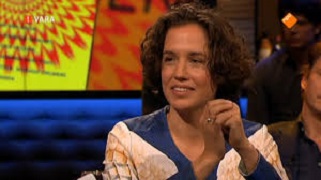
Myrthe van der Meer (Den Bosch, 1 maart 1983)
Zie voor nog meer schrijvers van de 1e maart ook mijn drie blogs van 1 maart 2015.
